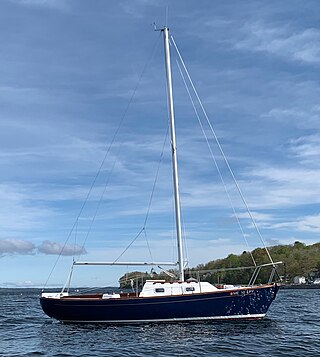The Triton 25, also called the Pearson 25, is an American trailerable sailboat, that was designed by Gary Mull and first built in 1984. The design is out of production.
The Blazer 23 is a Canadian trailerable sailboat that was designed by Bruce Kirby as racer-cruiser and first built in 1988.
The Cal 3-24, also called the Cal 24-3 and the Cal 24 (Hunt) is an American trailerable sailboat that was designed by C. Raymond Hunt Associates as a racer-cruiser and first built in 1983.
The Coronado 23, also called the Sailcrafter 23, is an American trailerable sailboat that was designed by William Crealock as cruiser-racer and first built in 1969.
The Coronado 25 is an American trailerable sailboat that was designed by Ed Edgar and Frank W. Butler as a cruiser and first built in 1966.
The Freedom 24 is an American trailerable sailboat that was designed by William H. Tripp, III as a racer-cruiser and first built in 1994.
The Irwin 23 is an American trailerable sailboat that was designed by Ted Irwin as a cruiser and first built in 1968.
The Irwin 25 is an American trailerable sailboat that was designed by Ted Irwin as a cruiser and first built in 1969.
The South Coast 22 is an American trailerable sailboat that was designed by Carl Alberg, James Monroe and Hollis Metcalf as a pocket cruiser and first built in 1968.
The Morgan 22 is an American trailerable sailboat that was designed by Charley Morgan as a racer-cruiser and first built in 1968.
The Pearson 23 is an American trailerable sailboat that was designed by William Shaw as a cruiser and first built in 1978.

The Pearson 24 is an American trailerable sailboat that was designed by William Shaw as a cruiser and first built in 1967.
The Pearson Lark, also called the Lark 24, is an American trailerable sailboat that was designed by William Shaw as a cruiser and first built in 1966.

The Quickstep 24 is an American trailerable sailboat that was designed by Edward S. Brewer as a cruiser and first built in 1976.
The S2 6.7 Grand Slam is an American trailerable sailboat that was designed by Don Wennersten as a racer-cruiser and first built in 1980. The designation indicates the approximate length overall in meters.
The Seafarer 24 is an American trailerable sailboat that was designed by McCurdy & Rhodes as a cruiser and first built in 1974.
The Seidelmann 25 is an American trailerable sailboat that was designed by Bob Seidelmann as a racer-cruiser and first built in 1977.
The US Yachts US 21 is an American trailerable sailboat that was designed by Clark Scarborough as a racer-cruiser and first built in 1982.
The Triton 21, also called the Pearson 21, is an American trailerable sailboat that was designed by Clark Scarborough as a racer-cruiser and first built in 1985.
The Venture 222 is an American trailerable sailboat that was designed by Roger MacGregor as a cruiser and first built in 1971.


